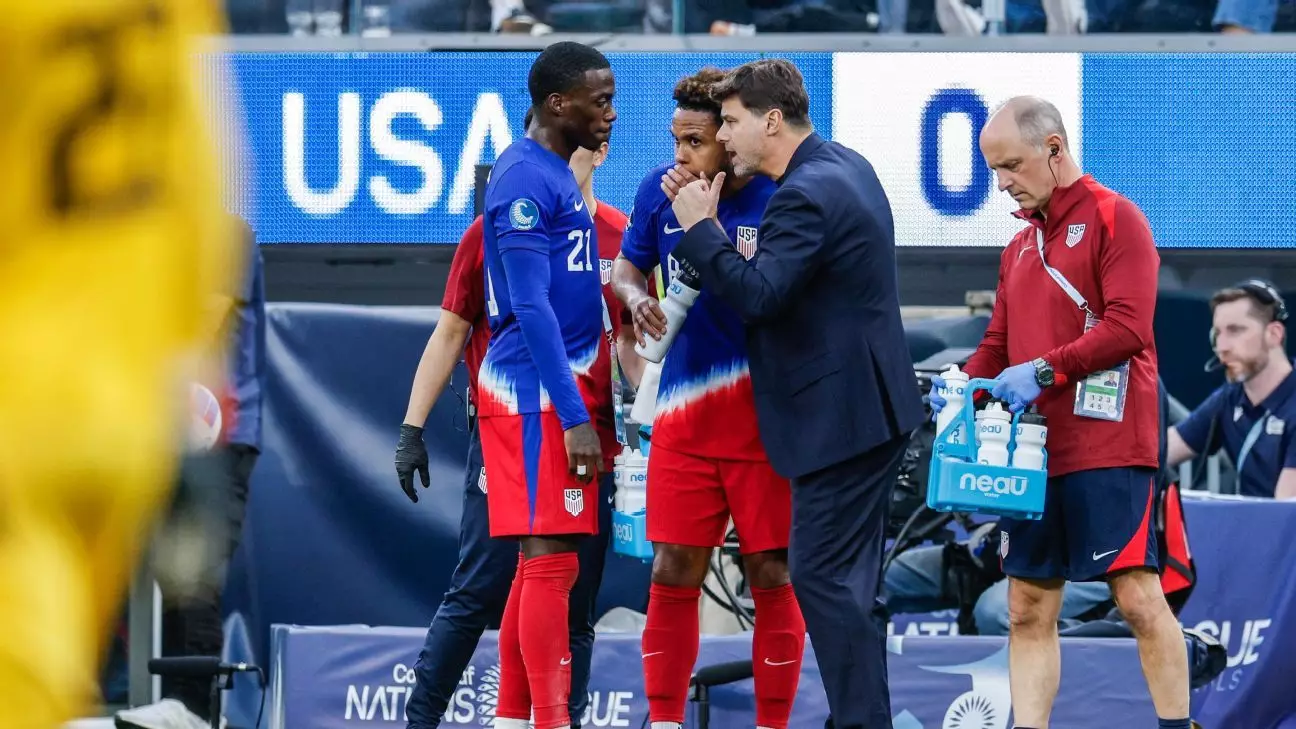In a stunning turn of events, U.S. men’s national team manager Mauricio Pochettino faced a harsh reality after watching his team suffer a discouraging 1-0 defeat to Panama in the semifinals of the Concacaf Nations League. Frustrated yet resolute, Pochettino made a bold statement that echoed through the hearts of fans and players alike: wearing the national team jersey doesn’t guarantee triumph. This painful truth serves as a stark reminder of the chasm that still exists between aspiration and achievement in U.S. soccer.
The overarching sentiment following the match was one of disappointment. Soccer fans had high hopes for a team that, on paper, was capable of clinching a victory with a dominant 66% possession. However, possession without purpose is rendered meaningless. The U.S. generated a meager expected goals (xG) of just 0.68, highlighting a glaring lack of creativity and incisiveness in their attacking play. Instead of a well-orchestrated offense, the U.S. delivered a lackluster performance that ultimately cost them dearly.
The Illusion of Control
Pochettino’s critiques about the team’s approach to the game hit the mark. The U.S. appeared far too comfortable, playfully passing the ball around with little intention, failing to apply the necessary aggression required to break the shackles of Panama’s defense. The inability to start strong is often a reflection of a broader mental hurdle that U.S. soccer players face: can they ever shed the mentality that they can outskill their opponents simply by showing up?
It’s evident that despite the analytics favoring their ball possession, the reality reflects an unpleasant truth: the sense of entitlement bred within a cloistered football culture does not guarantee victory. The U.S. players, lulled into complacency, failed to establish an early rhythm; they let the game slip away, and instead of seizing the momentum, they relied on it as a crutch. Possession in soccer exists not merely to be held but to create opportunities—a lesson lost on the players on this fateful evening.
Missed Opportunities: A Distorted Sense of Risk
The turning point in the second half did spark tentative hope—Timothy Weah’s ventures down the left flank showcased the potential lurking within the squad. However, when substitute Patrick Agyemang squandered a glorious chance in the 82nd minute, it crystallized the mounting frustration among supporters. The inability to convert critical opportunities into goals exemplified a shocking lack of killer instinct typically associated with top-tier teams.
While it’s easy to question Pochettino’s decision-making, particularly regarding the benching of creative talent like Giovanni Reyna, it is essential to pinpoint the catalyzing issue: a failure to take risks. Soccer requires that players not only dwell in safety but that they embrace moments of uncertainty in pursuit of triumph. By adhering to a conservative game strategy, the U.S. ultimately stifled its chances of overcoming tactical challenges posed by their opponents.
Under Pressure: The Resounding Echo of Past Defeats
This latest loss was not an isolated occurrence; it marked the third consecutive defeat against Panama in competitive matches. Such a trend raises an unsettling question: what is it about the U.S. men’s national team that leads to repeated failures on the grand stage? Each encounter with the Canaleros exposes a vulnerability in American soccer, suggesting that coaching changes and tactical shifts alone cannot mask the systemic issues ingrained in this essential aspect of sports culture.
The devastating elimination from the Nations League comes at a perilous time for U.S. soccer, as the team is set to face Canada in a consolation matchup, a far cry from the aspirations they once had to seize this tournament. The morale is low, the confidence shaken, and Pochettino’s challenge involves rekindling that competitive edge necessary for any substantial turnaround.
Facing a New Reality
In the aftermath of such profound disappointment, Pochettino’s assertion stands as a rallying call for growth and tenacity. The U.S. must navigate away from a stagnant mindset and embrace the notion that success in soccer isn’t guaranteed through mere participation. A new era must foster a culture that prizes resilience, adventure, and the uncompromising spirit necessary to thrive on the field. In a competitive landscape, to persist, the U.S. needs not just skill, but an unyielding resolve to conquer difficult challenges by being proactive and daring.
As fans across the nation grapple with disappointment, the onus is clearly on the players and coaching staff. Only through dedication, courage, and unrelenting commitment can they hope to transcend this moment and reclaim the respect of a soccer-loving nation that yearns for greatness.


Leave a Reply